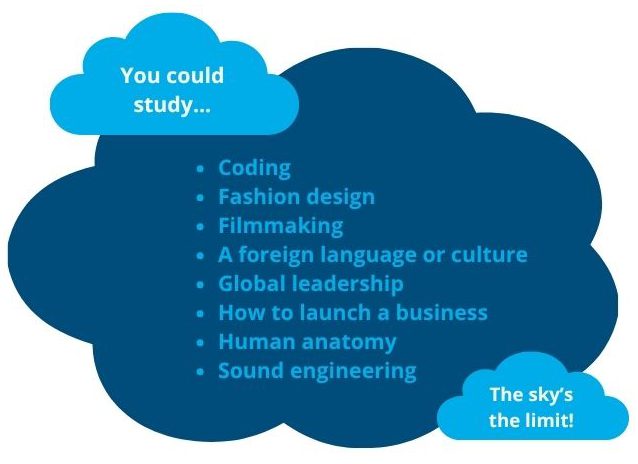
Gap years with a purpose: Exploring yourself and the world
Posted by
Your teen years include countless opportunities to learn, grow, and explore new horizons. These years also come with intense pressure to define your identity and career path. As your high school years wind down, it’s natural to feel some anxiety about what comes next. College? Trade school? No school? The sheer number of options can make the decision-making process intimidating.
Instead of rushing into a job or degree program, consider taking time to discover what really matters to you with a gap year! Gap years offer more than a break from schooling. They’re meant to inspire you by offering a chance for meaningful self-exploration, helping you learn more about yourself and the world. Think of a gap year not as an extended summer break, but more like the first chapter of your adult life.
Questions to ask yourself before taking a gap year
The first step? Taking a clear-eyed self-assessment: understanding where you are now and how a gap year can help you achieve your goals. Ask:
- When you think about the future, how does it make you feel? Are you excited about pursuing one of your interests or exploring new places? Or worried about living independently or choosing a career that interests you? Sit with your feelings, without judgment.
- What are you most looking forward to? Even if you can’t exactly envision your future, think about the good things coming your way! Maybe it’s making new friends, dedicating more time to a hobby, or even moving to a different city.
- Do you have anxieties about the future? Realistically, everyone experiences at least a little anxiety about the future. It’s totally normal, but try not to spiral or let your anxieties define what comes next. Writing down your worries or fears can reduce the intimidation factor and help you identify which ones you can actively address.
- What do you hope to gain from your gap year? Think of these as your “gap year goals.” Instead of “visit every continent” or “write the next great American novel,” focus on the qualities you hope to develop, like confidence or independence, or what you want to gain clarity about by the end.
- What is the best-case scenario? What is the worst? Any gap year, structured or not, has unexpected highs and lows. Anticipating these moments may help you feel more prepared for challenges and ready to embrace the good times.
- What do you imagine yourself doing after your gap year? Gap years are meant to be temporary, so think about what happens after your gap year, too. Applying to school, jobs, and other training programs takes time, and some have specific deadlines. A realistic post-gap year plan can make you (and your parents) feel more confident about taking one.
Meaningful ways to spend your gap year
Once you’ve decided to take a gap year, the next step is figuring out how to spend it.
Skill-building and self-directed learning
Just because you’ve graduated doesn’t mean the learning must stop. Many gap year programs encourage continuing your education, whether you want to focus on a particular skill or take a full course load for credit.

Imagine taking a semester of classes in Spain with students from around the world, conducting marine biology field research in South Africa, or exploring the ethics of AI with a 1-on-1 mentor in your own home. The key to a meaningful program? Choosing an experience that feels like it’ll be enjoyable and a stepping stone to college or a future career.
If you want to become a professional artist, a gap year program like Idyllwild Arts might be perfect — students attend classes, receive mentoring, and create a professional portfolio. Want to boost your GPA and strengthen your academic record? Laurel Springs School's programs include college-level, honors, and AP courses. Thinking about a tech career? Try a coding bootcamp or free MOOCs (Massive Open Online Courses) that you can access anytime and complete asynchronously.
Career exploration and professional development
Many gap year programs are designed to help students explore potential careers. These programs aim to develop crucial skills, like self-awareness, communication, and resilience, while also exposing you to potential careers through panels, workplace tours, and work experience.
Some gap year programs are internship-based; others combine structured learning with hands-on projects and experiences. Niche training programs have a specific focus, like the International Culinary Center or The Apprenticeshop's boatbuilding and sailing program.
Need to support yourself financially or save money during your gap year? Look for paid work experiences. You could work on a farm in Australia or New Zealand, complete an internship in Daegu, South Korea, or join AmeriCorps and become a student mentor in your own city.
Volunteering and community service
Another meaningful way to spend your gap year? Participating in a service program or volunteer organization. Volunteer work offers a range of opportunities, from teaching and building to leading and collaborating. The time commitment can be flexible, from a few hours a week at a local community garden to a full-time, year-long immersion in another country. You can also combine your desire to volunteer with your other interests, like surfing or sports.
No matter the scale, location, or type of volunteering you choose, prioritize opportunities encouraging sustained engagement. A one-week volunteer trip abroad is often less meaningful and transformative than a longer commitment with the same organization or community.
Cultural immersion
While gap years and travel often go hand in hand, opt for the less-touristy, more immersive experiences when traveling abroad. What’s cultural immersion? Deeply engaging with a culture different from your own, including its language, cuisine, arts, and general way of life. Many immersion-focused programs are also purpose-driven, with an overarching focus on helping others, whether that be human rights, environmental conservation, or public health.
Cultural immersion programs frequently combine volunteering, language learning, and personal development. As you research programs, consider the experiences they offer and how they integrate participants into local communities. Avoid the country-hopping, sightseeing itineraries and look for community- or education-centered programs.

Planning a meaningful gap year
However you spend your gap year, plan it with intention. If you choose a structured program, think carefully about its cost, logistics, and how its length aligns with your goals for the year. A DIY gap year requires meticulous planning from the start. You’re responsible for every detail, from budgeting and booking your travel and housing to deciding where to go, what to eat, and what to do.
Traveling abroad? Be mindful of your own safety and show respect for the culture you’re visiting. Familiarize yourself with the country’s language, cuisine, and customs. Staying close to home? Create a weekly schedule and set monthly goals to maintain your momentum.
No matter what you do, document your journey! Take photos, keep a journal, create a vlog or blog, and spend some time reflecting on what you’ve learned along the way.
If you're looking for additional ideas and inspiration, visit our Pathways After High School guide.
Blog Categories
- Career Advice
- College Admissions
- Colleges & Universities
- Financial Aid and Scholarships
- For Counselors
- For Parents
- For Students
- Gap Years
- Mental Health and Wellness
- Online Learning
- Performing and Visual Arts
- STEM Majors and More
- Summer Programs
- Teen Volunteering
- Trade & Vocational Schools
- Tutoring & Test Prep

Organization with listings on TeenLife? Login here
Register for Free
We’re here to help you find your best-fit teen-centered academic and enrichment opportunities.
Forgot Password
"*" indicates required fields








